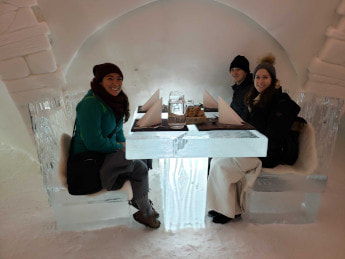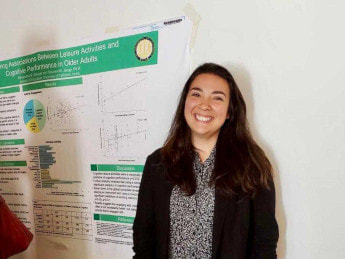"Exploring Associations between Leisure Activities and Cognitive Performance in Older Adults"6/4/2019
Doctoral student Alexandria Weaver and Associate Professor Susanne Jaeggi traveled to Finnish Lapland to share their research at the 5th Learning and Plasticity Conference (LaP). The title of their presentation was "Exploring Associations between Leisure Activities and Cognitive Performance in Older Adults." LaP is a cross-disciplinary meeting that connects psychological and neuroscience research on the mechanisms of learning and brain plasticity. The meeting is organized by the Åbo Akademi University, the University of Turku, and the Turku Brain and Mind Center. Description Research supporting cognitive reserve theory suggests that engaging in cognitive leisure activities may serve as a protective factor for the brain against age-related changes in mental abilities and is associated with a lower risk of developing Alzheimer’s disease and related dementias. While it is clear that development and maintenance of the cognitive reserve is not due to solely engaging in one specific activity, it is likely that not all cognitive activities are equal in their protective abilities. Here we explored the relationship between two types of leisure activities and cognitive performance in healthy older adults. We used data from a randomized controlled multisite intervention targeting cognitive skills for healthy older adults ages 65-85. This analysis only includes baseline data from 183 participant responses on self-report and various cognitive performance measures. Self-reports from the CHAMPS, an activities questionnaire for older adults, were coded and categorized into 2 types of leisure activities; social activities and intellectual activities. Composites were then created for social activities and intellectual activities. Factor analyses and correlational analyses were conducted to determine the relation amongst such activities to cognitive performance in 3 domains: Working memory (WM), inhibitory control, and episodic memory. Our analyses revealed that social activities and intellectual activities are positively correlated (r=.24, p<0.01). Further analyses did not reveal any meaningful correlations between the intellectual activities composite or social activities composite on any of the cognitive composites. Individual questions were then divided based on their factor loading to see how they correlated with each of the three cognitive domains. Amongst the social activities, visiting with family and friends was significantly correlated with overall WM performance (r=.12, p<0.05). Furthermore, participants who reported playing an instrument showed higher performance on the symmetry WM span task (r=.19, p=0.01), and computer use was significantly correlated with performance on the episodic metamemory task (r= 0.22, p<0.01) and symmetry WM span task (r=.18, p<0.05). Our results suggest that there is a relation between social and intellectual activities. Although most individual responses were not meaningfully related to cognition, visiting with family and friends was significantly correlated with WM performance, and playing an instrument and computer use were correlated with specific measures of WM and episodic memory. This preliminary finding is in support of the importance of social and cognitive engagement in aging. We will conduct further analyses to test whether the relationship between leisure activities and cognitive performance is moderated by personality and/or demographic characteristics.
Comments are closed.
|
Resources for:
|
|



